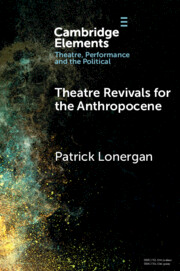Element contents
Theatre Revivals for the Anthropocene
Published online by Cambridge University Press: 18 August 2023
Summary
- Type
- Element
- Information
- Online ISBN: 9781009282185Publisher: Cambridge University PressPrint publication: 14 September 2023
References
- 10
- Cited by

